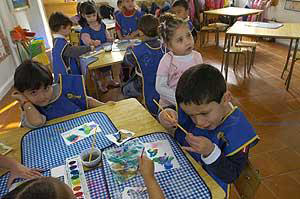 |
 |
 |
 Editorials | Issues | December 2006 Editorials | Issues | December 2006  
Private Schools Reflect Family Status, Values
 Carol Rosenberg - MiamiHerald.com Carol Rosenberg - MiamiHerald.com


| | TIME FOR ART: Four-year-old Nicolas paints a butterfly at his exclusive private kindergarten. (Marice Cohn Band/Miami Herald) |
Mexico City - It all starts with the right school.

Which is why the separated parents of 4-year-old Nicolás pool their resources to send their only child each day to an exclusive preschool - behind a vine-covered, 20-foot-high wall, past a phalanx of police and security guards.

Called Instituto Olinca, the private kindergarten feeds a K-12 prep school and features bilingual education and an expectation that everyone will go on to a university.

"The main mission is to form better human beings," says his mother Jazmín, who is actively involved in the Parent-Teacher Association. She drops the boy off en route to work, and has her mother pick him up afterward for after-school programs.

"Although we are not a religious school, we believe in values," explains preschool principal Cristina Merzal, who started as a teacher 32 years ago and took charge of the program 18 years ago.

Virtually everyone here gets an education; but, for the elite, in Mexico and elsewhere across Latin America, it would be unthinkable to send a son or daughter to a public school.

STATUS IMPORTANT

"Never! Status is very important," sniffs the writer Guadalupe Loaeza, who herself studied only in private schools, as did her children and do her grandchildren.

There are schools for Mexican Jews, ranging from religious to more secular; Catholic schools sponsored by different orders, and pricey prep schools, such as the American School, in a posh suburb, where graduating is seen as an almost-certain pathway to a U.S., Canadian or European university.

"Here in Mexico we really do not go to school in the neighborhoods," explains the principal, Merzal. "We look for the school [that] supports our values."

The cost? Up to 5,000 pesos, or about $500 a month, for the preschool program in a city where the legal minimum wage is less than $5 a day. "It's not the most expensive," Merzal concedes. "But it is expensive."

And far beyond the reach of the majority of Mexican mothers and fathers.

Olinca features a cosmopolitan curriculum: bilingual education in English and Spanish, French later, plus a core foundation of cultural internationalism and, for older kids, even a student government called The Olinca Republic, which gives future Mexican adults a taste of politics.

This year's student council president is 11.

And, unlike the nation itself, girls have been elected.

Special school programs include karate to teach discipline, robotics to make science fun and chess for kids who do not yet read - an activity that took Jazmín by surprise when her 4-year-old boy, known to his family as "Nico," came home and asked to sign up.

So she inquired at the school: "It teaches patience, strategic thinking - and sometimes, to lose."

Olinca preschoolers color to classical music, drill on the colors of the rainbow in English and learn to articulate more like an American.

Nico has special classes, once a week - on Wednesday, wedged between swimming classes on Tuesday and Thursday.

CHARITABLE WORKS

Values are taught through good works of charity. Kids bring in powdered milk for porridge for public school children, collect pesos for UNICEF and create coloring paper social contracts with their instructors that teach them how to be good citizens of the Olinca Republic.

I must respect my friends, says the contract of a preschooler named Carlos, colored with stick figures. The pacts get more sophisticated as the kids get older.

Later, after Nico turns 11, will come cultural exchanges - one- to three-week study-abroad trips, to teach students the meaning of globalization. Past classes have gone to such far-flung locales as India, France and the Czech Republic. They've gone to Argentina, Canada and Costa Rica; and to Portland, Ore., Charlotte, N.C., and Pittsburgh in the United States.

Meantime, students learn their own history through cultural events and monthly field trips around the capital, to parks and museums.

"It's worth it," says Jazmín of the expense, who sees it as a sound investment in her boy's future.

crosenberg@MiamiHerald.com | 
 | |
 |



